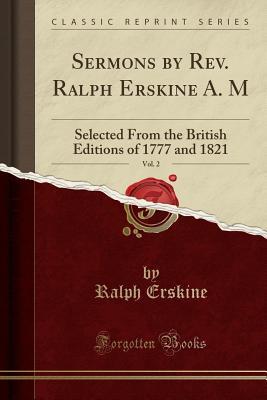- Bible
- Read the Bible
- Bible Versions
- Verse of the Day
- Reading Plans
- Verses by Topic
- Books of the Bible
- Bible Images
- Study
- Commentaries
- Concordances
- Dictionaries
- Encyclopedias
- Sermons
- Bible Atlas & Maps
- BP Wiki
- Devotionals
- Today's Devotionals
- Light of the World
- All Devotionals
- Inspirational Quotes
- More
- Picture Quotes
- Videos
- Inspirational
- Bible Study
- What The Bible Says
- Bible Q&As
- Daily Bread
- Bible by Genre
- Bible Stories
- Random Bible Verse
- Community
- Store
Sermons by Rev. Ralph Erskine A. M, Vol. 2: Selected from the British Editions of 1777 and 1821 (Classic Reprint)
by Ralph Erskine
Excerpt from Sermons by Rev. Ralph Erskine A. M, Vol. 2: Selected From the British Editions of 1777 and 1821
I hope, the subject I am here in providence directed to, will natively lead us, if the Lord bless it, to a suitable exercise upon a thanksgiving-day after a communion; even With gratitude Of soul to sing the praises of a God in Christ, and that whether we have met with a smile or a frown from heaven, or both, at this occasion. If any here have got a smile, or found him to be a smiling and a present God, they may Sing of mercy; if any here have got a frown, or found him to be a hiding God, they may Sing of judg ment; or, if any here have got both a smile and a frown, they may Sing of both, and say, I will Sing of mercy and judgment: unto thee, O Lord, will I sing.
The words contain the psalmist's holy resolution to praise and glorify God for all his dispensations towards him, now that he was advanced to the kingdom Of Israel: and in them you may shortly notice, The sweet work that is resolved upon, namely, to sing The sweet Singer that thus resolves, namely, david; I Will sing.
About the Publisher
Forgotten Books publishes hundreds of thousands of rare and classic books. Find more at www.forgottenbooks.comwww.forgottenbooks.com
This book is a reproduction of an important historical work. Forgotten Books uses state-of-the-art technology to digitally reconstruct the work, preserving the original format whilst repairing imperfections present in the aged copy. In rare cases, an imperfection in the original, such as a blemish or missing page, may be replicated in our edition. We do, however, repair the vast majority of imperfections successfully; any imperfections that remain are intentionally left to preserve the state of such historical works.
I hope, the subject I am here in providence directed to, will natively lead us, if the Lord bless it, to a suitable exercise upon a thanksgiving-day after a communion; even With gratitude Of soul to sing the praises of a God in Christ, and that whether we have met with a smile or a frown from heaven, or both, at this occasion. If any here have got a smile, or found him to be a smiling and a present God, they may Sing of mercy; if any here have got a frown, or found him to be a hiding God, they may Sing of judg ment; or, if any here have got both a smile and a frown, they may Sing of both, and say, I will Sing of mercy and judgment: unto thee, O Lord, will I sing.
The words contain the psalmist's holy resolution to praise and glorify God for all his dispensations towards him, now that he was advanced to the kingdom Of Israel: and in them you may shortly notice, The sweet work that is resolved upon, namely, to sing The sweet Singer that thus resolves, namely, david; I Will sing.
About the Publisher
Forgotten Books publishes hundreds of thousands of rare and classic books. Find more at www.forgottenbooks.comwww.forgottenbooks.com
This book is a reproduction of an important historical work. Forgotten Books uses state-of-the-art technology to digitally reconstruct the work, preserving the original format whilst repairing imperfections present in the aged copy. In rare cases, an imperfection in the original, such as a blemish or missing page, may be replicated in our edition. We do, however, repair the vast majority of imperfections successfully; any imperfections that remain are intentionally left to preserve the state of such historical works.
BUY NOW
Paperback, 516 pages
Published April 29th 2018 by Forgotten Books
© 2025 Bibleportal.com All rights reserved.

Ralph Erskine was the brother of another prominent churchman, Ebenezer Erskine. After studying at the University of Edinburgh, Ralph was ordained assistant minister at Dunfermline in 1711. He ratified the protests which his brother laid on the table of the assembly after being rebuked for his synod sermon, but he did not formally withdraw from the establishment till 1737.
He was also present at, though not a member of, the first meeting of the "associate presbytery". When the severance took place over the oath administered to burgesses, he adhered, along with his brother, to the burgher section.
His works consist of sermons, poetical paraphrases and gospel sonnets. The Gospel Sonnets have frequently appeared separately. His Life and Diary, edited by the Rev. D Fraser, was published in 1842.
... Show more